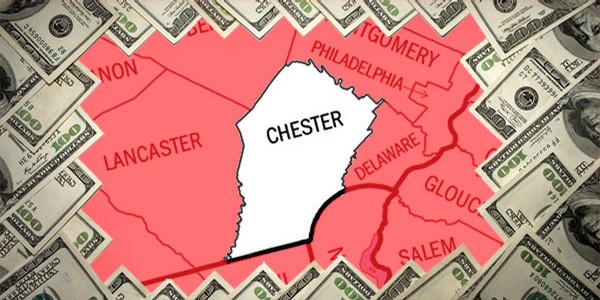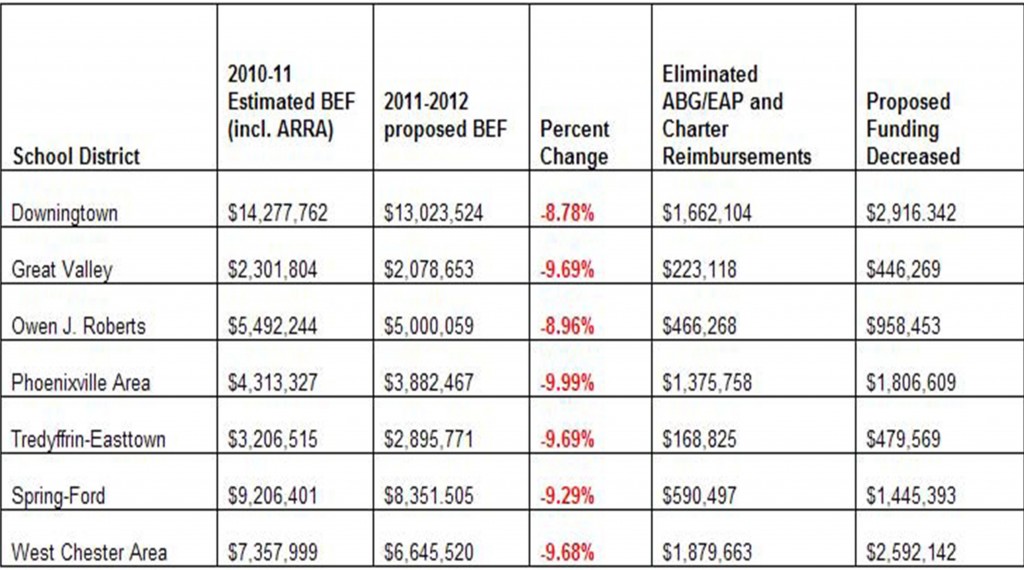Last night was the T/E School District’s Finance Committee Meeting. One of the solutions offered to help close the looming deficit for the 2011-12 school district budget is the outsourcing of the custodial services. Outsourcing of the custodial service is expected to save the school district an estimated $950K in the budget. Last night, several members of the district’s custodial union (many of whom are township residents) attended the meeting to make the case to preserve the current custodial arrangement.
From Pete Bannan’s article in today’s Main Line Suburban newspaper on TESD Finance Committee Meeting, Pete reports:
” . . . All the school-board members were present for the meeting and the pleas during the public comments did not fall on deaf ears. Finance chair Kevin Mahoney said the school board wasn’t doing this to save money but is required by state law to balance the budget.
“The options are evaporating,” said Mahoney. “The governor’s budget turned a $2.2-million shortfall into a $3.6-million shortfall. It’s simply a matter of economics.”
Mahoney said no decisions had been made. The proposal is due April 4 and the board has 120 days to review it. Mahoney also said the school board is open to ideas and constructive ways to reach its goals. He suggested the public contact elected state officials, such as State Rep. Warren Kampf, State Sen. Andrew Dinniman and Gov. Tom Corbett, and ask for real pension reform. . . “
Ray Clarke attended the Finance Committee meeting and offers the following notes for Community Matters readers. As always, I am grateful for Ray’s attendance at school district meetings, his analysis and then for sharing them with us!
Monday’s Finance committee meeting vividly illustrated the problem TESD finds itself in.
Very many TENIG (Tredyffrin Easttown Non-Instructional Group) members and others spoke about the value of the current system with experienced, stable, professional and flexible staff, compared to the risks of a possibly cheaper, but high turnover, less trustworthy, and less committed external provider. There was also commentary about the impact on diversity. There was much talk about membership in the T/E Family, and a wise – but unfortunately innocent – CHS student suggested that a family would sit down and work out a fair solution for all its members, rather than focusing on one group. (No prizes for guessing the elephant in this particular family room!)
The out-sourcing analysis does offer a glimmer of hope, though. The district has issued an RFP, responses due May 4, which then must be given to TENIG by May 11. TENIG is allowed 120 days to respond. Let’s assume that out-sourcing would really save the $950,000 estimate. Now, the district has already identified overtime and substitute strategies that would save $150,000 with the existing staff. Is it wishful thinking that the staff could use their professional experience to identify further cost-saving practices, and offer compensation roll-backs and benefits adjustments that could move the impact over 50% towards the expected cost savings? Taxpayers might be very willing to pay a premium for service assurance.
After 90 minutes the committee got down to a review of budget projections. The $1.3 million impact of the PA budget was confirmed, with the $1.1 million reduction in Social Security reimbursement to the 15% “aid ratio” being the real surprise. Apparently it has been at 50% for as long as anyone in the room could remember. I would think that this might be subject to lobbying: where is Kampf on this one? It apparently squarely targets districts like TE that have a low aid ratio.
There was agreement to move ahead to crystallize a number of strategies listed with low or moderate impact on the education program. The biggest ones:
– Change the prescription provider: Impact $250,000
– Eliminate raises for all non-union staff: $395,000
– Integrate Applied Technology into Elementary Core: $300,000
– Plan for a 5% increase in medical costs (vs previous 10%): $412,500
– Fees for extra-curricular activities: $80,000
The result of all of this is $2.3 million of fairly solid strategies (including all the above except the last) and $0.45 million of more speculative ones (including the last). The current scenario assumes $0.15 million of the specualtive ones, for a total of $2.4 million of strategies. Add in Act 1 and Exception tax increases of $3.2 million (3.8%), subtract the $1.3 million state cuts, the $8.9 million deficit comes down to – a mere – $4.6 million.
Board policy does place some limits on use of the Fund Balance, but one obvious use is to pre-fund approved programs implementation-limited by contractual attrition rules. There was an example presented of how $1.1 million could be designated in this way in 2011/12. (I worry that there might be a little double counting with the above $300,000 AT elimination – does that need attrition?).
It’s fairly clear that the $29 million Fund Balance could absorb the $4.6 million draw down, but beyond that the picture is bleak. Annual deficit projections of $10 million or more (after Act 1 tax increases, driven by benefits) show that the district can not afford even flat TEEA salaries without the fund balance being wiped out in 2 years.
Here’s where the State House Bill to allow teacher furloughs to balance the budget comes into play. According to Dr Waters, that would allow action even with a CBA in place. However, Dr Brake reported that although the bill was up for Committee hearings, those hearings were abruptly cancelled (!). But the legislative process does continue, apparently.
We know that there are some actions involving furloughs that are already approved as having minimal educational impact. Others, like modest increases in class sizes, might be similarly low impact. Getting to $10 million can hardly be done without real impact, though. When it comes down to students and jobs versus union compensation, we might find out who is really part of the TE Family.

